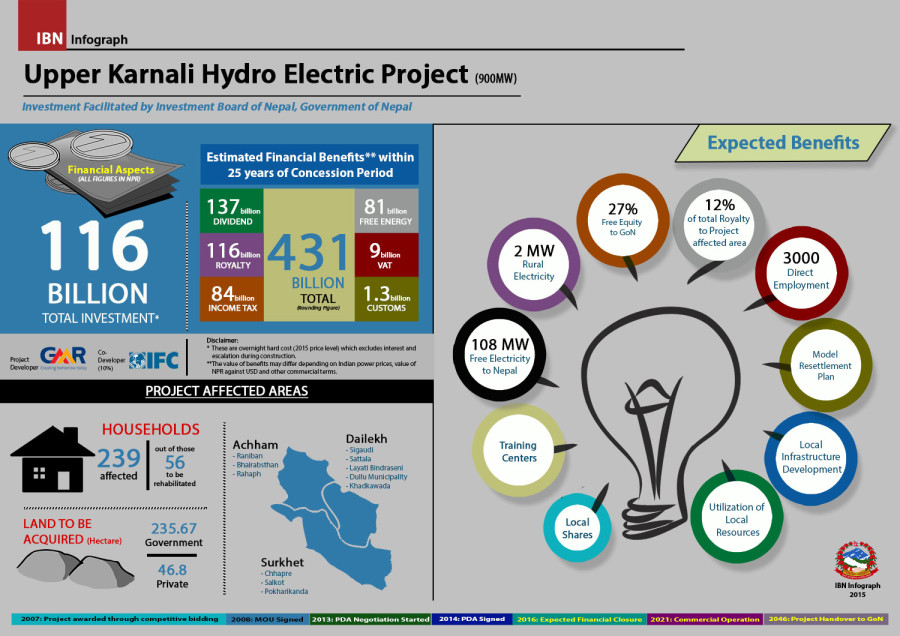Money
Bangladesh agrees to pay 7.7 cents per unit for Upper Karnali power
The energy-hungry country will pay out a massive Tk381.60 billion (equivalent to Rs511.69 billion) over 25 years to procure 500 megawatts of electricity.
Prahlad Rijal
Bangladesh has formalised its pledges to buy electricity from the 900-MW Upper Karnali hydropower project in Nepal which is currently being developed by India’s infrastructure giant GMR Group, opening the door for the first-ever trilateral power trade.
In the latest landmark development, the Cabinet Committee on Public Purchase of Bangladesh has given the nod to import power at a rate of 7.71 cents per unit for a period of 25 years, according to Dhaka Tribune. The decision was made on Wednesday.
Kulmeet Sharma, GMR appointed project head of Upper Karnali in Nepal, confirmed the development.
The tariff rate, a major sticking point in past discussions between the Indian developer and Bangladeshi energy officials, is around 2.5 cents less than what GMR Energy had offered to Bangladesh.
This will now help GMR to arrange funds for the construction of the power plant because the lender will approve credit only if a market for the electricity to be generated by the project is secured.
"It was a much-awaited development and now a letter of intent from Bangladesh is expected within 4-5 weeks," said Kulmeet Sharma, GMR appointed project head of Upper Karnali. “After the project receives the letter of intent, it will open the doors to make financing arrangements to build the power plant in western Nepal.”
According to Sharma, the project has been unofficially holding talks with potential lenders including local banks and multilateral agencies and with a formal offtake agreement in hand, it will gear up the required processes and also clear bottlenecks pertaining to land acquisition.
As per the proposal cleared by Bangladeshi officials, the energy-hungry country will pay out a massive Tk381.60 billion (equivalent to Rs511.69 billion) over 25 years to procure 500 megawatts of electricity.
Nepal will receive 108 MW out of the remaining 400 MW for free while GMR plans to sell the rest to the government of the Indian state of Haryana.
A principal agreement on the commercial terms of the power purchase agreement excluding tariff rates was reached between the Bangladesh Power Development Board and GMR last year and negotiations had been struck over the rates since then.
According to an official close to the situation, the two parties were in disagreement, probably because of the ‘high rate’ proposed by the developer.
The export-oriented Upper Karnali project has a high price tag due to surcharges placed on the use of Nepali and Indian transmission grids. As the developer is required to relay energy using Nepali and Indian infrastructure, it will have to pay wheeling charges to both Nepal and India. Apart from the charges, the loss of electricity in long-distance transmission is also usually high.
Power-hungry Bangladesh signed a memorandum of understanding (MoU) with India’s NVVN to import electricity from the Upper Karnali scheme via India during Bangladeshi Prime Minister Sheikh Hasina’s visit to India in April 2017.
As Indian laws don’t allow private developers to export electricity produced in third countries over Indian transmission lines, Bangladesh signed an MoU with the state-owned cross-border electricity trading agency while GMR was a witness.
In absence of a power purchase agreement, the Indian developer has already sought deadline extensions for financial closure twice from Investment Board of Nepal, the facilitating agency.
GMR Energy and the government signed a memorandum of understanding on building the plant in 2008.
As of September 2019, the developer has not been able to acquire 12 hectares of unregistered and unidentified land parcels, out of planned 49 hectares and is awaiting forest clearance permits from four community forest groups.




 10.12°C Kathmandu
10.12°C Kathmandu













